Setting aside national pride and eternal discussions about which car brand is the best, Japanese automakers are acknowledged worldwide for their quality, durable vehicles. However are these companies worthy investments? Below, I will look at Toyota Motor Corporation (ADR) (NYSE:TM), Honda Motor Co Ltd (ADR) (NYSE:HMC), and Nissan Motor in order to figure out if they stand as attractive opportunities for long-term investors.
Toyota unchained
Any list of Japanese automakers must start with Toyota Motor Corporation (ADR) (NYSE:TM), the biggest in the industry, not only locally, but also globally. Having endured the last crisis and the Great Japan Earthquake, the company seems to be recuperating slowly. Over the last year, the firm has benefited from a favorable exchange rate, increased production volume and unit sales, and global efforts to reduce costs.
The company’s main competitive advantage stems from its manufacturing expertise. Focus has been put on quality and design over the last few years, even creating region-specific vehicles. However, prices can remain low due to the lower social security expenses faced by the company compared to the Detroit Three (Ford Motor Company (NYSE:F), General Motors Company (NYSE:GM), and Chrysler).
The other great advantage the company holds is its brand name. Respected among traditional car buyers for its quality, Toyota Motor Corporation (ADR) (NYSE:TM) has also become the leading company in hybrid car makers. Going forward, this last segment is expected to drive profits and growth.
Emerging markets are also to contribute with plenty of growth in the years ahead. Asia in general, and China, India, and Indonesia (plus Brazil) in particular, provide considerable space for expansion in markets with above-average GDP growth expected going forward.
In fact, analysts expect Toyota Motor Corporation (ADR) (NYSE:TM) to deliver an average annual EPS growth rate of about 45%, tripling the industry average estimates. So, trading at only a 50% premium to the industry average at 23 times its earnings, this stock still looks like a buy to me. Upside potential looks great and dividends and stock repurchases aren’t scarce either.
Americans also buy Japanese cars…
Honda Motor Co Ltd (ADR) (NYSE:HMC) is the other really famous Japanese car maker. With growing demand in the U.S. and a weak yen in relation to the U.S. dollar, the company seems poised to grow. In fact, management expects to reach record sales in the U.S. over the next few quarters, mainly on the back of four very popular car models. Although the brand has enjoyed of wide recognition for its quality for a while now, going forward, sales will probably be driven by one specific characteristic in Honda Motor Co Ltd (ADR) (NYSE:HMC)’s vehicles: fuel efficiency. Actually, the firm´s CEO assures that the company will have the number-one fuel economy rating in each vehicle category by 2015.
Honda Motor Co Ltd (ADR) (NYSE:HMC)’s constant focus on innovation keeps its vehicles desirable. This reflects on its results for FY 2013. Revenue rose 25% and earnings 33%, mainly driven by stronger sales in the automotive sector, principally in the U.S. As a result, its cash position also ameliorated, and the projected dividend yield surpasses 2%. Moreover, the firm´s gross margins are well above its peers, meaning that it gets to keep a larger amount of money for every sale.
Other markets, like India, and the motorcycle segment provide plenty of growth opportunities. Same can be said about the falling Yen. Consequently, analysts expect Honda Motor Co Ltd (ADR) (NYSE:HMC) to deliver an average annual EPS growth rate in the 26%-31% range, double of the industry average. Meanwhile, its valuation at 17.5 times its earnings looks pretty attractive. I´d say buy and hold; you will probably not regret it.
The upcoming one
Nissan is third in my list. Maybe not as well-known as Honda Motor Co Ltd (ADR) (NYSE:HMC) and Toyota Motor Corporation (ADR) (NYSE:TM) in the past, it has become a very popular and acknowledged brand over the past few years. The recent alliance with Renault has allowed both firms to enjoy scale advantages and leverage over providers, while sharing technology and vehicle platforms.



